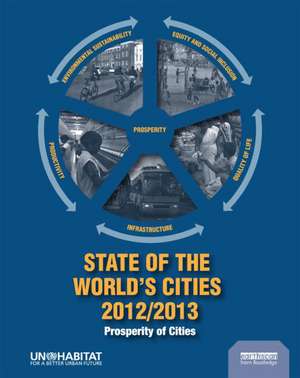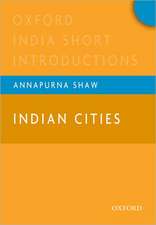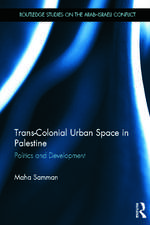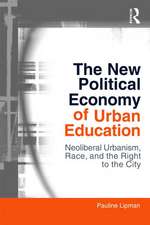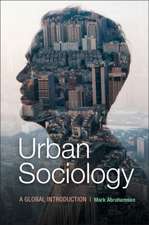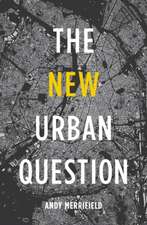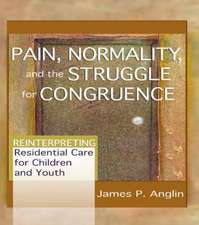State of the World's Cities 2012/2013: Prosperity of Cities
Autor Un-Habitaten Limba Engleză Paperback – 18 mar 2013
What this new edition of State of the World’s Cities shows is that prosperity for all has been compromised by a narrow focus on economic growth. UN-Habitat suggests a fresh approach to prosperity beyond the solely economic emphasis, including other vital dimensions such as quality of life, adequate infrastructures, equity and environmental sustainability. The Report proposes a new tool – the City Prosperity Index – together with a conceptual matrix, the Wheel of Prosperity, both of which are meant to assist decision makers to design clear policy interventions. The Report advocates for the need of cities to enhance the public realm, expand public goods and consolidate rights to the 'commons' for all as a way to expand prosperity. This comes in response to the observed trend of enclosing or restricting these goods and commons in enclaves of prosperity, or depleting them through unsustainable use. The Report maps out major policy steps to promote a new type of city – the city of the twenty-first century – that is a 'good', people-centred city. One that is capable of integrating the tangible and more intangible aspects of prosperity, and in the process shedding off the inefficient, unsustainable forms and functionalities of the city of the previous century. By doing this, UN-Habitat plays a pivotal role in ensuring that urban planning, legal, regulatory and institutional frameworks become instruments of prosperity and well-being.
| Toate formatele și edițiile | Preț | Express |
|---|---|---|
| Paperback (1) | 253.38 lei 6-8 săpt. | |
| Taylor & Francis – 18 mar 2013 | 253.38 lei 6-8 săpt. | |
| Hardback (1) | 359.77 lei 6-8 săpt. | |
| Taylor & Francis – 11 aug 2017 | 359.77 lei 6-8 săpt. |
Preț: 253.38 lei
Preț vechi: 314.53 lei
-19% Nou
Puncte Express: 380
Preț estimativ în valută:
48.50€ • 52.70$ • 40.77£
48.50€ • 52.70$ • 40.77£
Carte tipărită la comandă
Livrare economică 21 aprilie-05 mai
Preluare comenzi: 021 569.72.76
Specificații
ISBN-13: 9780415838887
ISBN-10: 0415838886
Pagini: 208
Dimensiuni: 210 x 280 x 15 mm
Greutate: 0.75 kg
Ediția:New.
Editura: Taylor & Francis
Colecția Routledge
Locul publicării:Oxford, United Kingdom
ISBN-10: 0415838886
Pagini: 208
Dimensiuni: 210 x 280 x 15 mm
Greutate: 0.75 kg
Ediția:New.
Editura: Taylor & Francis
Colecția Routledge
Locul publicării:Oxford, United Kingdom
Public țintă
Professional and Professional Practice & DevelopmentCuprins
Overview and Key Findings Part One: Re-thinking Urban Prosperity 1.1. Conceptualizing Urban Prosperity 1.2. Urban and Regional Trends Part Two: Dimensions of City Prosperity 2.1. Productivity and the Prosperity of Cities 2.2: Urban Infrastructure: Bedrock of Prosperity 2.3: Quality of Life and Urban Prosperity 2.4: Equity and the Prosperity of Cities 2.5: Environmental Sustainability and the Prosperity of Cities Part Three: Policies for Prosperous Cities 3.1: From Comparative Advantage to Urban Prosperity 3.2: Innovating to Support the Transition to the City of the Twenty-first Century Statistical Annex Bibliography Index
Descriere
New State of the World’s Cities report from UN-Habitat suggests a fresh approach to prosperity beyond the economic dimension.
